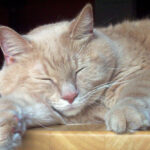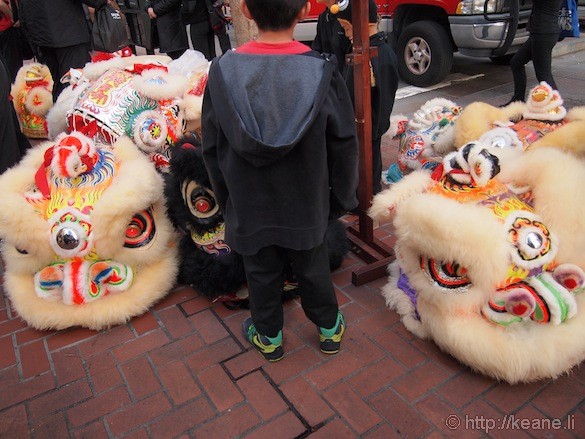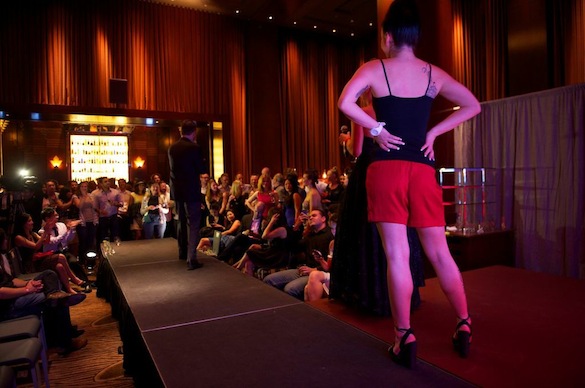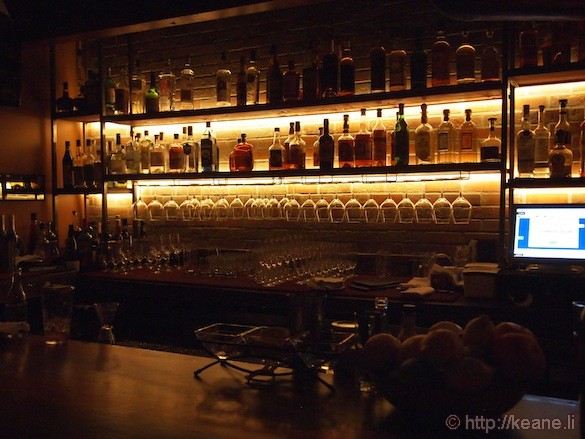FEATURE: Maus Haus
An Eclectic Collective
By: Keane Li
July 2010
“Serendipitous” would be an appropriate word to describe the formation of Maus Haus. From their initial meetings to their creative process, everything about this San Francisco electro-synth sextet seemingly fell into place. To achieve the eclecticism in their albums, the band of multi-instrumentalists undergo extensive experimentation in the studio. Anything can happen. Their reversal of the traditional songwriting process has yielded the unique (and very catchy) results presented in their debut, Lark Marvels and their new EP, Sea-Sides. Having already gained considerable regional attention, the band is poised for their first East Coast tour this summer.
Maus Haus is Joseph Genden, Jason Kick, Joshua Rampage, Aaron Weiss, Sean Mabry and Tom Hurlbut. The manner in which the band formed is as happenstance as their studio work. “Jason and I met in Indiana when I was 17, kind of randomly,” recalls Sean. “He had just moved to San Francisco and was back East visiting.” The rest, the band describes, was meeting through friends at shows and “Craigslist magic.” The band solidified in the winter of 2007, and began recording and creating their first material in 2008. “It was a domino effect,” says Joshua. “I think we have a pretty good meeting of the minds. Everyone kind of brings their own idiosyncratic, subjective opinions to the table and things just go wild from there.”
Maus Haus, as a band name, was essentially meaningless, used as a placeholder that became something more. “As long as we can spell it in German,” they say half-jokingly. And what was originally a side project for a team of musicians in other bands certainly became something more. While their releases leverage the support of indie labels for distribution, the band is currently unsigned and spreading like wildfire primarily through word-of-mouth, supported by the strength of their live shows and recorded work. Says Jason: “Our first demo was a five-song unmastered CD-R and [Joshua] hand drew on it. We used to send those out to people and we basically had something posted on our MySpace page that said, ‘If you want one, just ask.’ So we were doing free demos until our record came out. And a lot of people took us up on that. It was really cool.”
With the exception of their original CD-R demo, the band chooses to bypass the CD medium for vinyl and digital download. “CDs are dead,” Sean says quickly. “Vinyl is really a beautiful product,” adds Jason. “You make a record, it’s very tangible. It’s very physical. And a CD, I don’t think anyone’s really gotten that attached to their discs. You can feel the grooves on a record. It’s very tactile and I think we would do vinyl and CD if someone wanted us to, but it just so happened we really felt strong about vinyl. It was our first priority.”
While each member of Maus Haus brings with them unique influences, the band finds its primary inspiration in krautrock and 70s disco dance. In contrast with many electronic groups, Maus Haus purposefully aims for a manual, more organic feel to their rhythmic repetition. The band prides itself on foregoing any form of sequencing in their live work, preferring to perform as many of their sounds as they can in fashion with their vintage influences. “To me,” says Jason, “I hear real human beings playing. Even if they’re trying to be repetitive, there’s people trying to be mechanical, and to me that’s way more attractive than having these things that are programmed.”
The band uses innovative methods to work together when gathering six independent minds might be difficult. An established web server allows each of the members to contribute musically from their homes. The inventiveness in their sound owes itself partly to their creative flirtations from the intimacy of being alone. Says Jason, “On recordings, it’s like anyone could be anybody. And I think that’s just how we like to do it, because the way we create songs is pretty strange. A lot of it comes from a couple of people working together alone in a recording situation and then bringing it to other people. And that’s actually a precedent that was set the first time any of us got together.” In crafting Sea-Sides, however, the band modified this precedent by planning more of the songwriting process – composed bridges and transitions – in order to piece together the best of their recorded moments of inspiration.
“I think one thing that sets us apart from other bands,” says Sean, “is that recording is a big part of our writing process. Usually a song idea will come out of recording and experimentation as opposed to people jamming together and coming up with things on the fly. And I think this adds a different kind of almost surreal element to a song once you create something in this recording world and you learn to play it later. You’re playing straight from your brain instead of through your fingers. You learn with your fingers what to play.”
But where artistic talent and ideals meet, so often is conflict found. “We definitely have our points of disagreement but that’s what’s great. I think disagreements really help,” says Jason. What kind of disagreements, specifically? “Fistfights. Long email threads,” Sean jokes. “Unfortunately we’re not at the point where we can afford a therapist,” adds Jason, “but if we ever could, we probably will. (laughs)”
As the band admits, “between six people there are 300 opinions.” So how does a six-person band of involved artists work together and sustain a healthy team relationship? “Lots of communication,” says Sean. “I don’t think you can be creative or collaborate with someone unless you know them, unless they are your friends, unless you understand a certain element of their brain or their spirit or however they work. Because, otherwise, it’s like you’re playing on top of each other. I think that’s a big part of what true collaboration is. My advice to independent musicians is to only make music with your best friends.”
Jason continues: “I think the basis of friendship means that you can have conflict and you’ll be able to survive it because it’s an understood thing that everyone’s going to say what they think at any given moment. It becomes an easier thing to deal with because you realize that we’re going to fight about this, but, no matter what, we’re going to be friends at the end of the night. That’s kind of what family or best friends do. Ultimately, we’re talking about music here, but at the end of the day, it doesn’t go home in our heads.”
Their advice to other bands: “Tour as soon as you can,” says Jason, “and play with bands you believe in.” Joshua adds a piece of advice that can ultimately apply to all facets of life, “It’s important to ask yourself, ‘Am I having fun?'”
In speech, Maus Haus exhibits the same eclectism and mature artistry prevalent in their music. And, as the interview came to conclusion, they depart by handing over a lone pack of Pop Rocks, in concert with the controlled randomness that so defines their work, casually with a disclaimer: “Don’t eat these while driving.”
Link to Maus Haus feature
Download Performer Magazine, July 2010







